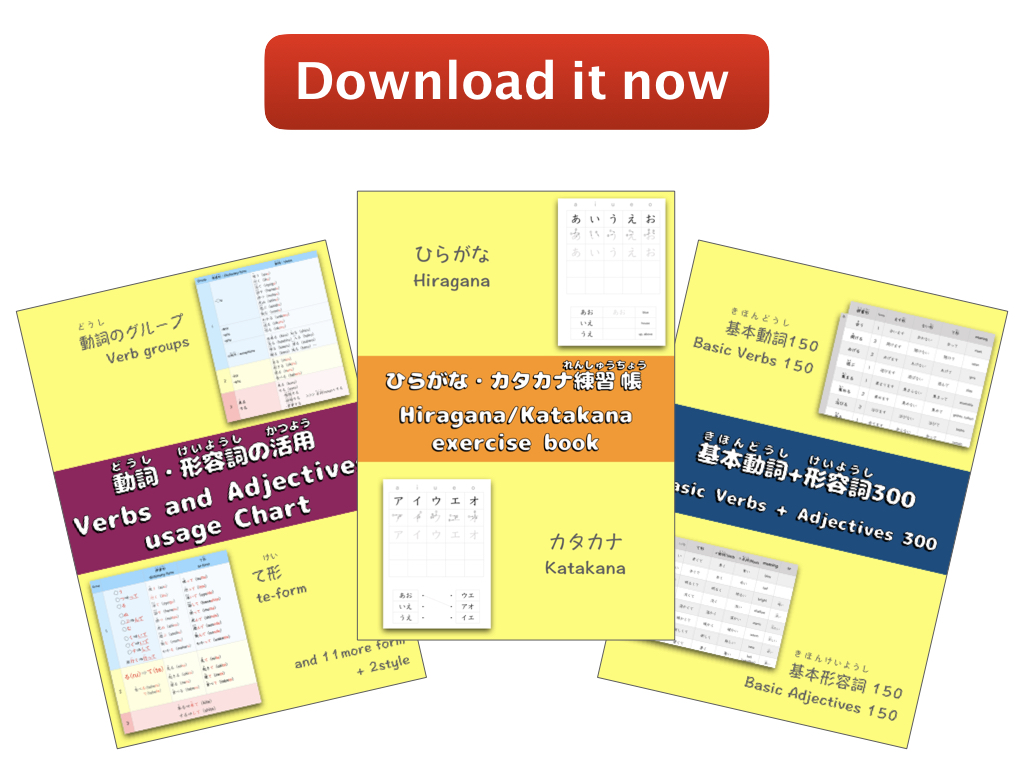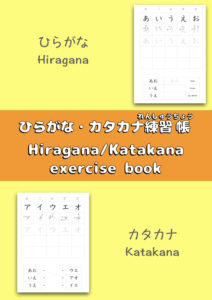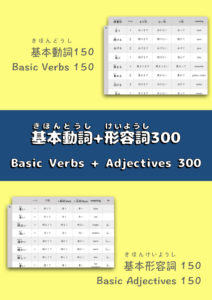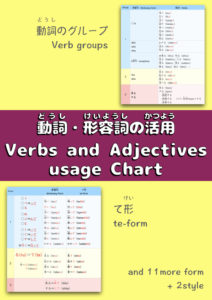Japanese Language Learning Kit Free Download
Do you love Japanese language?
Are you learning, or planning to learn Japanese language from now?
Or are you already familiarised or just a beginner in learning Japanese?
if you download and use this kit,
The difficulty in learning Japanese language that you once felt,
will now be as easy and fun within arm’s reach!
Shall we deepen our understanding of Japanese language using this learning kit?
Download it nowContents of Japanese Learning Kit
Reviews and feedbacks of the learning kit
-Dahye from Korea
 My favourite thing about this learning kit is you can download the files digitally.
My favourite thing about this learning kit is you can download the files digitally.
My book shelves are filled with so many Japanese language text books as I need them all to help with my Japanese language studies.
It is satisfying to know that I’ve put a lot of effort to study Japanese, but actually it is also taking up too much space.
If I ever travel to Japan to study, work or just for travels, I wouldn’t be able to decide which books I should bring with me?
And if I were to buy the books in Japan, it will be too costly to send them back to Korea.
If I think about it, this learning kit is so convenient for me!
I usually use an iPad, so with this learning kit in my iPad, I can even use the stylo(pen) to handwrite characters and be able to access the materials easily!
I recommend for Japanese language beginners that if you always have this learning kit at hand, you can conveniently practise and construct Japanese sentences whenever you need to.
And by practising it, you will be able to smoothly construct sentences before you realise it!
-Lynne from Australia
 I wasn’t sure where to start before my trip to Japan. And I don’t think I want to take a course just for my holiday in Japan.
I wasn’t sure where to start before my trip to Japan. And I don’t think I want to take a course just for my holiday in Japan.
Luckily with this free learning kit, I can just memorise the Hiragana and Katakana during my spare time. I’m not very good at Katakana, but good enough to read and refer to the list and examples.
I like how after each explanation that it has actual example sentences on how to use the different forms. I especially like how it teaches us to make verb-forms.
It really gives me a good fundamental understanding of the Japanese language.
Thank you for providing this free learning kit! Ganbarimasu!
–Cyrus from U.S.
 Things i like about the books.
Things i like about the books.
Using colors to highlight significant parts of sentences, regarding the verb formation technique.
Vocabulary has space for drills, good for printing out on paper.
Vocabulary book covers different topics for different situations/context.
Recommendations for Japanese language beginners
Learn the stroke orders of 50 basic alphabets.
It is also common for those to say “I’m perfect with Hiragana! But still not very good at Katakana…”
This learning kit provides practises to learn both “Hiragana” and “Katakana”
There is a total of 300 vocabularies, so if you were to practise 1 vocabulary a day, you can master them within 1 year; if you practise 10 vocabularies within a day, you can remember all of it within 1 month!
If you are able to remember them all, you can enjoy and feel more at ease when you travel on your first trip to Japan isn’t it?

Recommendations for more experienced Japanese language learners
You can then revise your Japanese language using the “Verbs and Adjectives usage Chart”.
For example, in verbs, can you understand and differentiate between “Passive-form”, “Causative-form” and “Causative passive form”?
========
– 父に怒られた。 (Passive-form)
My father is angry at me.
– 社長がお茶を入れさせる。 (Causative-form)
The president made me pour some tea.
– 母に掃除させられた。 (Causative passive form)
I was forced to do the cleaning by my mother.
=========
You may have already understood the grammar structures, but with this learning kit, you can revise and check through again, and this will help you to be a step closer in mastering Japanese.
You can easily browse through and even take a quick glance to look it up through the learning kit.
It will be a useful guide to just have it by your side when you are studying Japanese.
In order to master and perfect your Japanese language, we recommend using the vocabulary book for reference to assist you.

Download it now
The advantages of using the Learning Kit
- You can start practising and remembering “Hiragana” and “Katakana” before your trip to Japan, even prior to commit to study Japanese language.
- By having the learning kit by your side, you can easily form sentences to express using a combination of listed vocabularies available!
- You can now easily browse through those complicated Japanese usage in a glance.
- The most important thing is to have a solid foundation.
- The important details have been gathered so you can revise through easily and conveniently.
A Greeting from the founder and creator of the Japanese Learning Kit, Chika sensei

Konnichiwa, it’s Chika sensei.
Do you feel that learning Japanese is so hard and troublesome?
Isn’t it because of the Japanese characters?
Japanese language consists of three types of characters, which are “Hiragana”, “Katakana” and “Kanji”.
At the very beginning, it may sound like a lot of trouble to memorise them all.
But rest assure!
If you can pass through this stage, Japanese isn’t really a hard language to learn.
So, let’s start remembering the characters by using this learning kit’s “Hiragana and Katakana exercise book”!
Let me explain why learning Japanese wouldn’t be that hard to do.
First of all, the pronunciation is simple.
In my 17 years of experience of being a Japanese teacher, I have never come across a student who had such difficulty and could not pronounce Japanese characters at all. (Pronouncing like a native speaker is a different story)
The grammar structures are not particularly difficult compared to the other languages. Japanese language too has similar rules with any other languages. If you learn and remember them little by little, in time, anyone will be able to construct simple sentences.
If you are already able to read Hiragana and Katakana, you can continue to the “Basic Verbs and Adjective 300”, where you can practise using verbs and adjective which can be use to express in everyday life conversations.
Now with all these skills, you’re surely be able to speak enough Japanese to survive!
However.
It may be difficult to utilise or to construct sentences, since some verbs are specific only to the Japanese language.
In those situations, you can refer to the “Verbs and Adjective usage Chart” to help you with it.
Even for those who are familiar with the Japanese language can sometimes realise “Hmm…? How can I use this verb?”
The Usage Chart is actually similar to a Multiplication Table Chart.
If you always keep it at hand, and to be able to revise it anytime, it can be a really useful tool to help with your communication whenever you need to.
- Native Japanese, born and raised in Japan
- Master Degree in Japanese Language Education
- Certified in the Japanese Language Teaching Competency Test
- 17 years of experience in Japanese language teaching (10 years in Japanese school, 7 years in University)
- Completed numerous researches in the Japanese Language studies
- Publication in Japanese Language Studies
- Teaching experience abroad including Korea and Taiwan
- Languages: Japanese (mother tongue), English (intermediate), Korean (intermediate) , Chinese (beginner)



